'Great': US envoy answers Iran's top diplomat in cryptic, deleted post

US President Donald Trump's special envoy Steve Witkoff reacted "great" on Wednesday to a spirited statement by Iran's foreign minister on X before swiftly deleting the post.

US President Donald Trump's special envoy Steve Witkoff reacted "great" on Wednesday to a spirited statement by Iran's foreign minister on X before swiftly deleting the post.
It was not immediately clear if the expunged monosyllable, which marks the first public interaction between Tehran and the Trump administration, was meant in earnest, irony or error.
Witkoff's office did not immediately respond to an Iran International request for comment.
Tensions between Tehran and Washington have ramped up in recent days after Trump mooted bombing the country.
Foreign Minister Abbas Araghchi had written four paragraphs lamenting Washington's exit from a nuclear deal and recent talk of attacking Iran.
"10 years after signing the JCPOA—and 7 years after the US unilaterally walked away from it—there is not ONE SHRED OF PROOF that Iran has violated this commitment," Araghchi wrote, referring to a 2015 agreement from which the United States withdrew in Trump's first term.
"Diplomatic engagement worked in the past and can still work. BUT, it should be clear to all that there is—by definition—no such thing as a 'military option' let alone a 'military solution'," he added.
Witkoff, who has spearheaded talks for Trump in Israel-Hamas and Ukraine-Russia conflicts as part of the populist President's bid to wind down foreign reports, replied simply: "Great".
Within minutes, the reply was deleted from Witkoff's account.
The post came weeks after after a leaked chat among senior administration officials including Witkoff about plans for an imminent attack on the Iran-aligned Houthi group in Yemen sparked consternation in Washington among Trump's opponents.
Critics said the inclusion of a prominent journalist in the group and the discussion of sensitive military plans on a commercial chat app, Signal, endangered national security and revealed too much about official thinking and intelligence sources.
Trump on Sunday warned that Iran could face bombing and secondary tariffs if a nuclear deal was not reached with Washington. The remarks prompted a sharp riposte from Iranian Supreme Leader Ali Khamenei, who warned of a "heavy blow in return" if Iran were attacked.
Trump had previously reached out to Khamenei in the form of a personal letter in an attempt to explore a new nuclear agreement and prevent military escalation, Witkoff said late last month.
"We don't need to solve everything militarily," Witkoff told Fox News.
"Our signal to Iran is let's sit down and see if we can, through dialogue, through diplomacy, get to the right place. If we can, we are prepared to do that. And if we can't, the alternative is not a great alternative."
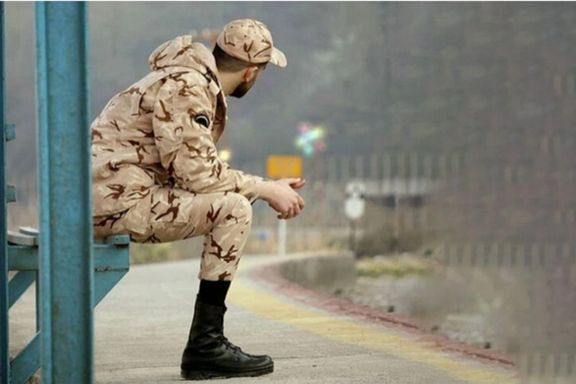
Soroush Salehi campaigned to have Canada label Iran’s Revolutionary Guards a terrorist group but now the law for which he strived may eject him and others forced into the group as conscripts.
In June of last year, Soroush celebrated Canada's decision to list the Islamic Revolutionary Guard Corps (IRGC) as a terrorist entity.
Little did he know, however, that his activism to ostracize the group that had dragooned him into service would upend his own life.
Soroush is part of a community of Iranians living in Canada who bitterly resent their country's rulers for impressing them into the Islamic Republic's security forces.
Along with the regular military and police, the IRGC is another agency that Iranian men could be forced to join to complete their mandatory military service.
A transnational paramilitary force, the Revolutionary Guards spearhead Tehran's influence in the Middle East, including training and arming of affiliates like Hamas, Hezbollah, the Houthis and Iraqi militias.
Now their lives on Canadian soil are in jeopardy and are left to the discretion of immigration officers who may deem them inadmissible under the new policy.
Iran International spoke to Soroush and two other Iranian nationals whose permanent residency applications are also in limbo and who do not wish to be identified due to security concerns. Iran International has also reviewed evidence demonstrating the men were conscripts and not permanent IRGC servicemen.
From advocate to victim
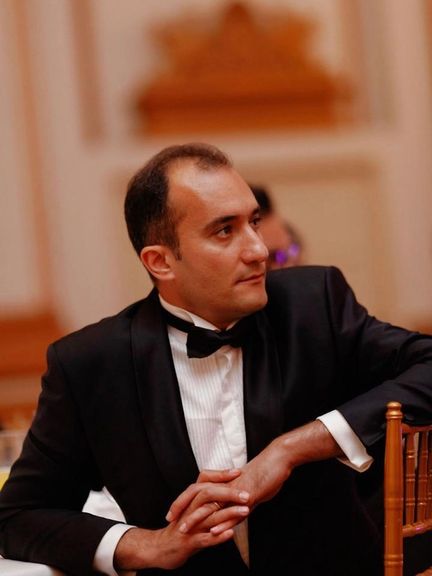
Soroush Salehi washed dishes and carried out other menial tasks and errands as an IRGC conscript fulfilling his mandatory service more than 18 years ago in Iran.
The mechanical engineer moved to Calgary, Alberta in search of a peaceful life, leaving his theocratic homeland where he saw no future.
He came to Canada in 2022 in the same year Iran's clerical rule saw the biggest challenge to their system in decades as the so-called Woman Life Freedom protest movement swept the country, only to be quashed with deadly force.
Soroush chose Canada after being rejected by the United States in 2020, despite his wife's American citizenship, after US immigration authorities deemed him a “member of a terrorist organization.”
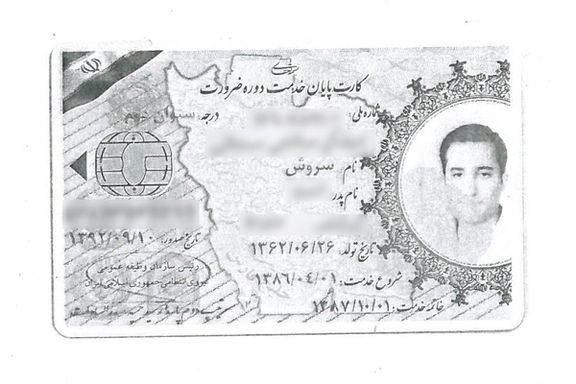
After US President Donald Trump put the IRGC on the US terrorist list in 2019, no exemptions were made for conscripts. Promises by President Joe Biden’s administration to look into exempting conscripts never materialized.
Now Soroush may be deemed inadmissible in Canada, too. Soroush is currently a temporary resident under a work permit and if no exemptions are provided, he might be deemed inadmissible and deported.
“I had dreams with my wife for a life here. Everything was good until September 2024,” Soroush told Iran International, “All my dreams are going to be devastated and are going to be shattered.”
Humiliation

Shahed, whose declined to use his real name citing security concerns, lives in Vancouver, British Columbia with his wife and five-year-old son who was born in Canada, who is a citizen.
From 2013 to 2015, Shahed completed his mandatory military service with the IRGC, and was tasked with administrative work, never training in military activities. The experience was deeply degrading, he said.
“The only purpose is just humiliating you, sitting there and cleaning the desk.”
In Canada with a work permit as an on-site engineer, Shahed's permanent residence application has been under review for more than three years.
Shahed had officially declared his mandatory military service and provided an ID card indicating the end of his mandatory service in a sworn affidavit reviewed by Iran International.

But he received and official letter saying immigration officers had “concerns surround your membership to the IRGC.”
“Based on your previous membership to the IRGC, I have reasonable grounds to believe you may be inadmissible to Canada ... (based on) membership in an organization that has engaged in subversion or terrorism,” the letter said. Shahed has responded protesting his innocence but has yet to hear back from authorities.
“Every day I have to deal with the stress when I wake up and be prepared that today I could be inadmissible and would have to leave Canada,” Shahed said. “I am not safe anymore.”
Shahed took part in Canadian protests in support of the 2022 unrest in Iran and fears for his safety if deported back to Iran.
Divorce - a way out?

Iran International spoke to another conscript and his wife over Zoom. They too did not want to be identified for their protection and for the safety of their family in Iran.
Since the designation, their lives are mired in uncertainty.
“This decision by the government is affecting every aspect of our lives,” said Farid's wife Roya. “We feel like prisoners here.”
They are both on an open work permit and applied for permanent residency in 2024, but since the IRGC designation their application has been stuck in security checks.
The married couple said they have decided not to leave Canada to travel or visit family because they fear being barred reentry.
Major life decisions like starting a family and buying a house have all been put on hold. If Farid is deported, they said they will likely get a divorce so his wife can have a life in Canada.
Farid told Iran International he served his mandatory service more than 10 years ago and never took part in military drills but worked in a clerical role at an Iranian bank.
Random process
The process in Iran for selecting conscripts to the various branches - whether for the regular army, the IRGC or law enforcement - is random.
Islamic Republic officials tasked with picking conscripts and officers often select recruits by pointing out young men arrayed in a line in front of them.
Prior to listing the IRGC a terror entity, Canada’s former Prime Minister Justin Trudeau had resisted calls to make the designation because of the plight of conscripts.
Activists continued to lobby for the change, arguing that identifying those low-level conscripts was an easy and verifiable task.
The terrorist designation empowers the justice system to prosecute IRGC members who have obtained Canadian citizenship and hold them criminally liable for crimes committed overseas.
On the fourth anniversary of the IRGC's downing of a civilian airliner which killed scores of Canadian citizens and residents, Trudeau said in Jan. 2024 that Canada was looking at a way to punish the group.
“We know there is more to do to hold the regime to account and we will continue our work, including continuing to look for ways to responsibly list the IRGC as a terrorist organization.”
When the official announcement was made, Justice Minister Arif Virani said an individual’s willingness and intent to support the IRGC would be an important consideration under the Criminal Code.
Immigration, Refugees and Citizenship Canada told Iran International that applications are considered on a case-by-case-basis.
“Conscription, in itself, does not necessarily result in a person being deemed inadmissible to Canada," it said. "The admissibility of individuals will be assessed based on a number of considerations."
Those range from the nature of their role in the IRGC to their level of engagement with the organization, it added.
Sadeq Bigdeli, a Toronto-based lawyer who represents several conscripts, said probably only under ten former conscripts have been deemed inadmissible by courts.
Bigdeli said he submitted a petition for guidelines excepting conscripts and even provided a draft text.
“It's not only unfair, but also basically helping the Islamic Republic by diverting resources from where they should be: the real terrorists."
While IRGC conscripts have declared their service voluntarily, actual IRGC members - whom Bigdeli called "masters of deception" – are likely walking free in Canada.
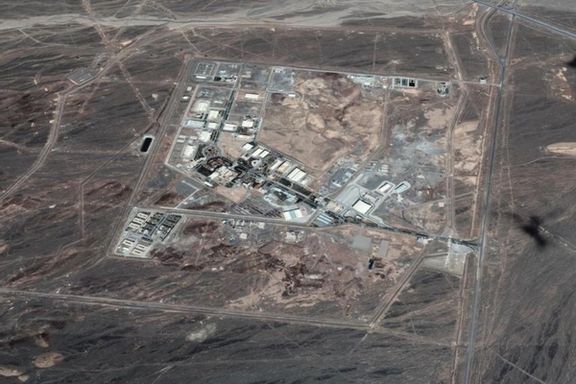
Moscow has rejected as illegal US threats against Iran's nuclear infrastructure, the Russian foreign ministry said on Wednesday, as tensions between Washington and Tehran have ramped up in recent weeks.
The remarks follow a discussion between the deputy foreign ministers of Russia and Iran Sergei Ryabkov and Iranian deputy foreign minister Majid Takht Ravanchi on Wednesday in which the two sides accused Western countries of "artificially and unreasonably" inflaming tensions over Tehran's nuclear program.
Using military force against Iran and threatening to strike its nuclear infrastructure would be "illegal and unacceptable," the Russian foreign ministry said according to Reuters, as they would cause "large-scale and irreversible radiological and humanitarian consequences" for the Middle East and the world.
US president Donald Trump has repeatedly expressed his preference for a nuclear deal with Iran but warned that a failure to reach one within a timeframe he has set could lead to military action.
The exact start date of Trump's reported two-month deadline to Iran remains unclear.
Tehran has rejected direct negotiations with the Trump administration and has suggested indirect talks via Oman.
A day earlier, Ryabkov warned against a US strike on Iran and expressed optimism that the stand-off could be resolved diplomatically.
"There is still time, and the 'train has not left the station' yet. We must intensify efforts to reach a reasonable agreement," Ryabkov said in an interview with Russian journal International Affairs.
"Russia is ready to offer its services to Washington, Tehran and all parties interested in resolving this issue," he added.
Kremlin spokesman Dmitry Peskov also said last month that Russian President Vladimir Putin had agreed to mediate nuclear talks between Washington and Tehran.
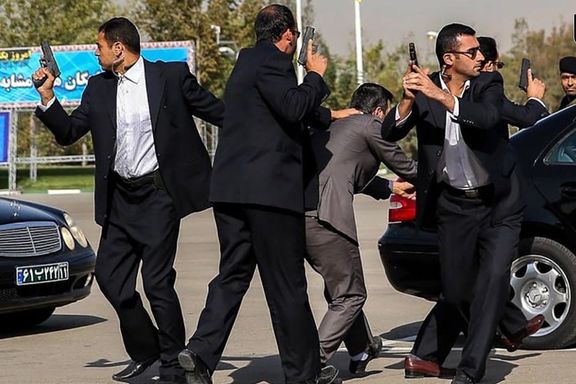
The Iranian police intelligence agency has issued thousands of gun permits to senior state officials in what a hacktivist group described as an unprecedented response to fear of internal reprisals.
Edalaat-e Ali, a group that has previously leaked surveillance footage and official documents, said the Law Enforcement Command of the Islamic Republic authorized the distribution of over 3,000 pistols to senior government officials.
The weapons, including stun guns and pepper spray, were issued following a clearance process involving three levels of vetting.
"This extraordinary move reveals the extent to which Iran’s leadership anticipates retaliatory action from its own citizens," Edalaat-e Ali wrote on X, saying the measure stemmed from fears that officials would be identified in future uprisings.
The group’s report could not be immediately verified by Iran International, but Iran has seen mounting tensions over economic hardship, water scarcity and political repression in recent months.
According to security sources cited by Edaalat-e Ali, personnel within the Islamic Revolutionary Guard Corps and the Intelligence Ministry had already received similar equipment for years.
The report surfaced shortly after farmers in central Iran torched a water transfer station in Isfahan province, disrupting supply to Yazd, amid a long-running dispute over access to the Zayandeh Rud river.
In January, two Supreme Court judges and clerics Mohammad Moghiseh and Ali Razini, both were shot dead in Tehran in a rare deadly attack on senior officials.
The assailant, a staff member responsible for refreshments at Iran's judiciary headquarters, committed suicide after the shooting. The judges were stalwart ideologues who had handed down harsh sentences on dissidents for decades.
“If the enemies think they can instigate sedition within the country, the Iranian nation itself will respond,” said Supreme Leader Ali Khamenei on Monday.
Security directives have tightened nationwide, particularly at police stations and military facilities, according to the hacktivist group.
Edalaat-e Ali added that daily visitor numbers are now capped and ammunition stores reduced, citing fears that weapons could fall into civilian hands in case of a takeover.
The Iranian government’s response to public dissatisfaction has largely been marked by repression, including what happened in the wake of the death of Mahsa Amini in police custody in September 2022.
The tragedy triggered widespread protests across the country under the slogan “Woman, Life, Freedom".
What began as outrage over Amini’s death rapidly transformed into a broader movement against the government, driven by long-standing political and social grievances. Authorities responded with mass arrests and a forceful crackdown, leading to over 500 deaths among demonstrators, according to rights groups and the United Nations.
Despite the efforts to silence dissent, the likelihood of future unrest remains high, not least as at least one third of the country now lives below the poverty line.
Years of economic mismanagement, widespread corruption, and the weight of international sanctions have deepened crises like fuel shortages and power outages, compounding public anger.
The government’s reluctance to raise fuel prices—mindful of the deadly 2019 protests—highlights its recognition of the growing risk of renewed demonstrations.

The White House is seriously considering an Iranian proposal for indirect nuclear talks, even as the US military significantly increases its presence in the Middle East, according to two US officials who spoke to Axios.
The deliberations come as Trump has repeatedly expressed his preference for a nuclear deal with Iran but warned that a failure to reach one within a timeframe he has set could lead to military action. The exact start date of Trump's reported two-month deadline to Iran remains unclear.
The consideration of indirect talks follows Iran's formal response to a letter sent by Trump to Supreme Leader Ali Khamenei in March. Iran rejected direct US talks as well as negotiating over its missile program and its support for armed regional groups, which the US has insisted must be part of any discussions.
While Trump had proposed direct negotiations, Iran has reportedly agreed only to indirect discussions mediated by Oman, which has previously played a mediating role between the two nations.
The US officials cited by Axios added that the Trump administration believes direct talks would be more effective but is not dismissing the Iranian proposal or Oman's potential role as mediator.
"After the exchange of letters, we are now exploring next steps in order to begin conversations and trust building with the Iranians," one of the US officials told Axios, emphasizing that no final decision has been made and internal discussions are ongoing.
More than one year of indirect talks with the Biden administration failed to produce an agreement. Those who believe Tehran might be playing for time see its demand for Omani mediation as a tactic to drag out negotiations until the end of the Trump administration.
Sources indicate an internal debate within the White House, with some officials believing a negotiated agreement is still possible, while others view further talks as futile and advocate for military strikes against Iran's nuclear facilities.
In a parallel move, the Pentagon is undertaking a substantial buildup of forces in the Middle East. The deployment would provide Trump with readily available military capabilities should he decide diplomatic efforts have failed.
The diplomatic maneuvering occurs against a backdrop of escalating rhetoric between Washington and Tehran.
Trump recently threatened to bomb Iran if a deal is not reached, prompting a sharp response from Khamenei, who warned of a "heavy blow in return" if Iran were attacked.
Iran has also lodged a formal protest via the Swiss embassy, which represents US interests in Iran, vowing a "decisive and immediate" response to any threat.
Tensions are further fueled by Iran's increased uranium enrichment, bringing it closer to becoming a nuclear threshold state, although Tehran maintains it does not seek nuclear weapons.
The Pentagon confirmed on Tuesday the deployment of additional troops and air assets to the region, with two aircraft carriers, the Truman and Vinson, remaining in the area.
Last week, B-2 stealth bombers were sent to the Diego Garcia military base in the Indian Ocean, a move a US official indicated was linked to Trump's deadline.
"Should Iran or its proxies threaten American personnel and interests in the region, the US will take decisive action to defend our people," Pentagon spokesperson Sean Parnell said in a statement.
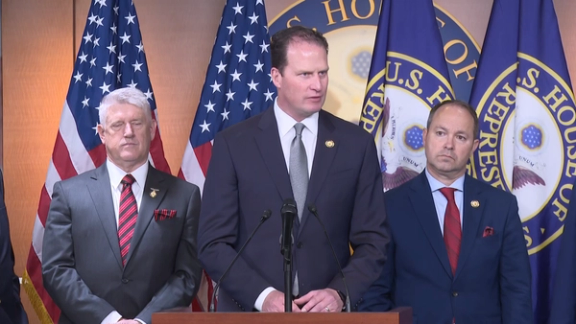
Republican lawmakers on Tuesday urged a tougher line on Washington's Mideast adversary Tehran and outlined plans for new legislation targeting the Islamic Republic as tensions have soared in recent days.
US President Donald Trump said on Sunday that Iran would face bombing if it did not agree to a new nuclear deal, prompting a senior advisor to Iran's Supreme Leader Ali Khamenei to moot the pursuit of a bomb in the event of an attack.
The Republican Study Committee (RSC) in a press conference advocated a series of new acts it said would increase pressure on Tehran in line with Trump's policy of stepping up sanctions in a bid to force the Islamic Republic to the negotiating table.
It named ten proposed pieces of legislation including the Free Iraq from Iran Act, Stop Corrupt Iranian Oligarchs and Entities Act and the No Sanctions Relief for Terrorists Act.
"This package is the strongest Iran sanctions and security package delivered to date.
The Iranian people are not the target," Congressman August Pfluger of Texas told reporters.
"It's the leadership that wants to gain a nuclear weapon and wants to continue that pariah state of sowing chaos and terrorism throughout the world," he added. "If I were them, I would make the choice of announcing loud and clear that they will not attain a nuclear weapon."
The US director of national intelligence Tulsi Gabbard said last week that Washington assessed Iran is not building nuclear weapons but that a taboo in Iran on discussing nuclear weapons in public was eroding.
The RSC is a conservative caucus for house Republicans founded in 1973.
"Right now, Tehran has a very clear offering, and that's to enter into negotiations in good faith with President Trump, who has laid out not only a roadmap for the Persian Farsi people to be successful, but for Iran to have a future," Representative Zach Nunn of Iowa said.
"It simply means stop funding terrorism, stop avoiding the sanctions regime, come to the table, de-escalate and end a nuclear regime that only ends in death for potentially hundreds of thousands of people in the Middle East."
Trump told NBC News on Sunday that if a deal was not reached, "there will be bombing — and it will be bombing the likes of which they have never seen before." Khamenei vowed retaliation to any attack.
An attack, a veteran nuclear negotiator and advisor to the Supreme Leader said on Monday, would push Iran toward acquiring nuclear weapons to ensure its defense,
Tehran denies seeking nuclear weapons and Khamenei has issued a religious injunction against them, but the United Nations nuclear watchdog says Iran has enriched more uranium than any state lacking a bomb.
"Not only are they pursuing a nuclear weapon to vaporize Israel and ultimately the United States, they're developing ICBMs, which can only be for one purpose, and that is to deliver a nuclear attack against the American people," Representative Joe Wilson of South Carolina said.
"And there must be verification, not the charades we've had with the previous administrations."
Trump withdrew from a 2015 international nuclear agreement with Iran in his first term after bashing it as too lenient. Khamenei said talks were pointless if a new deal could easily be broken.
The US military has deployed long range bombers at a strategic Indian Ocean airbase, a spokesperson told Iran International last week, a move which presaged major bombing campaigns against Afghanistan in 2001 and Iraq in 2003.